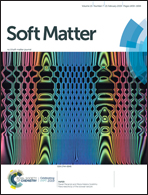Normal stress anisotropy and marginal stability in athermal elastic networks†
Abstract
Hydrogels of semiflexible biopolymers such as collagen have been shown to contract axially under shear strain, in contrast to the axial dilation observed for most elastic materials. Recent work has shown that this behavior can be understood in terms of the porous, two-component nature and consequent time-dependent compressibility of hydrogels. The apparent normal stress measured by a torsional rheometer reflects only the tensile contribution of the axial component σzz on long (compressible) timescales, crossing over to the first normal stress difference, N1 = σxx − σzz at short (incompressible) times. While the behavior of N1 is well understood for isotropic viscoelastic materials undergoing affine shear deformation, biopolymer networks are often anisotropic and deform nonaffinely. Here, we numerically study the normal stresses that arise under shear in subisostatic, athermal semiflexible polymer networks. We show that such systems exhibit strong deviations from affine behavior and that these anomalies are controlled by a rigidity transition as a function of strain.



 Please wait while we load your content...
Please wait while we load your content...